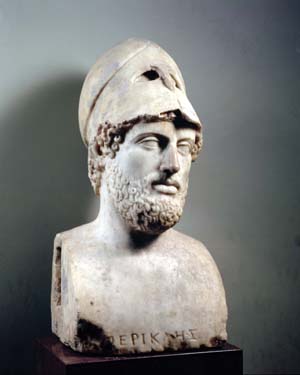Pericles, << PEHR uh `kleez` >> (490?-429 B.C.), was a Greek statesman whose name was given to the greatest period in the history of ancient Athens. He was the leader of the Athenian government for more than 30 years, and the Age of Pericles came to stand for all that was highest in the art and science of the ancient world.

Pericles was born in Athens, a member of a high-ranking noble family. He was educated by the greatest philosophers of his day. His mother was a niece of Cleisthenes, a statesman who had made many democratic reforms in the Athenian government (see Cleisthenes ). Cleisthenes had given the governing power to the assembly and popular courts. But because officials then received no pay, the poor could not afford to hold office. After Cleisthenes’ death, the Areopagus, a council of prominent citizens, took back its power over the city.
Pericles was determined to continue the reforms of his great-uncle and entered politics with the democratic popular party. He and Ephialtes, the leader of this party, worked to limit the power of the Areopagus. But Cimon, leader of the aristocratic party, opposed Pericles. Pericles managed to have his rival ostracized (banished) for favoring the Spartans.
Athenian leader.
In about 460 B.C., Ephialtes was killed. Pericles became leader of the popular party and the most powerful person in the state. He made many changes as head of the state. Public officials had never been paid before, but Pericles introduced salaries, first for the elected officials called archons, and later for all officers. According to Aristotle’s Constitution of Athens, as many as 20,000 people were on the public payroll. In 457 B.C., Pericles made his greatest reform. The common people were allowed to serve in any state office.
Pericles wanted to make Athens the most powerful state in Greece. He tried to expand the power of Athens by foreign conquest. Athenian troops fought in Egypt, Boeotia, and the Aegean Islands. This angered Sparta, and the two states broke off friendly relations.
War with Sparta.
Pericles’ wars were not all successful, and Cimon was allowed to return from exile to lead the armies. Cimon fought successfully against Persia, and Athens made a favorable peace with that country in 449 B.C. Three years later, Athens signed a 30 years’ peace treaty with Sparta allowing Athens to keep Aegina, Euboea, and the cities of the Delian League. But Pericles feared there could be no peace with Sparta, for the Spartans were jealous of Athenian power.
The Athenians had moved the treasury of the Delian League from Delos to Athens during the war with Persia. Pericles persuaded the Athenians to use this money and the money paid by the subject states to build up the Athenian navy and to beautify Athens. He employed the finest architects and sculptors to build and decorate the temple of Athena Nike, the Propylaea, the Parthenon, and many other structures. The state enjoyed prosperity, and literature and philosophy flourished.
The Peloponnesian confederacy, headed by Sparta, declared war on Athens in 431 B.C. Pericles persuaded the Athenians to adopt a new and difficult strategy. He called all the people of the surrounding districts into the city and allowed the Spartans and their allies to lay waste to the surrounding districts as they pleased. Pericles continued to build up the navy with the hope that Athens could defeat the Spartans with sea power. In 430 B.C., a plague broke out in the city, and many people died. The Athenians began to blame Pericles for all their troubles, and for a short while removed him from power. But he was soon restored to office. Pericles died of the plague during the war.
